Overview
Every month, we carefully curate a selection of AI startups that demonstrate strong potential through their novel approaches, technological breakthroughs, or unique applications.
Our spotlight focuses not just on companies with impressive funding rounds, but on those creating tangible impact across diverse sectors—from healthcare and sustainability to enterprise solutions and creative technologies.
In this month’s edition, we turn our attention to a remarkable collection of AI startups that have caught our eye.
1. Clay
Founded: 2017 | Location: New York | Valuation: $1.3 billion –Link
Clay is transforming how businesses approach data enrichment and sales outreach. This rising startup in the AI sector is focused on providing a comprehensive solution for data enrichment and workflow automation, critical components for modern sales and marketing strategies.
Technological Innovation:
Clay’s core technology unifies access to data from a multitude of providers, allowing businesses to gather detailed insights on prospects and customers. Leveraging AI-powered research agents, the platform automates complex data collection and analysis tasks that were previously manual and time-consuming. This enables practical applications such as building targeted lead lists, enriching CRM data with real-time information, and automating personalized outreach sequences based on identified signals.
Market Influence:
A notable recent development for Clay was securing $40 million in expansion funding in January 2025, which followed a $46 million Series B round in June 2024. This investment valued the company at $1.25 billion, reflecting significant market adoption and investor confidence. Clay has a vast number of notable clients including Canva, Open AI and Notion etc.
Future Trajectory:
By providing a centralized environment for data access and AI-driven automation, Clay aims to enhance the precision and productivity of go-to-market operations. Its potential impact lies in enabling teams to execute more data-informed strategies and foster more relevant interactions with potential and existing customers.

2.Bidgely
Founded: 2011 | Location: Mountain View, California | Valuation: $500 million – Link
Bidgely is applying artificial intelligence to transform utility operations and customer engagement. The company specializes in AI-powered energy analytics, providing utilities with deep insights derived from energy consumption data.
Technological Innovation:
Bidgely’s core technology, the UtilityAI™ platform, utilizes patented disaggregation techniques to break down whole-home energy usage into appliance-level detail without requiring additional hardware. This granular visibility enables utilities to understand consumption patterns, identify opportunities for efficiency, and better manage the impact of distributed energy resources like EVs and solar. Real-world applications include personalized energy reports for customers, enhanced grid management based on real-time load data, and targeted programs to support electrification.
Market Influence:
A significant recent development for Bidgely was the acquisition of Grid4C in March 2025. This move expanded Bidgely’s AI capabilities, particularly in predictive analytics for grid-side management and fault detection. The company’s technology has a reputation for its capacity to drive significant energy savings, improve customer engagement, and support the adoption of electric vehicles and renewable energy sources.
Future Trajectory:
By providing utilities with actionable intelligence from meter data, Bidgely is positioned to play a crucial role in modernizing the grid, improving customer satisfaction, and supporting the transition towards a more sustainable energy future.
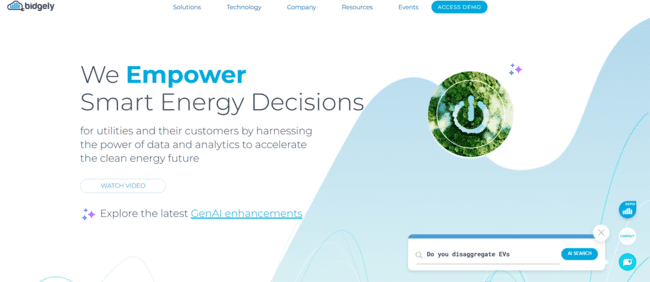
3.Intelecy
Founded: 2018 | Location: Trondheim, Norway – Link
Intelecy focuses on enabling manufacturing and industrial sectors to harness the power of AI without requiring coding skills. The company’s AI-driven platform empowers industries to minimize waste, reduce energy consumption, and improve overall productivity while maintaining quality standards in manufacturing environments.
Technological Innovation:
Intelecy’s key offering is a no-code machine learning platform designed specifically for industrial applications. This technology empowers users without extensive programming backgrounds to build and deploy AI models. The platform facilitates the analysis of industrial data to address real-world challenges such as optimizing production processes, implementing predictive maintenance strategies to minimize downtime, and driving overall operational efficiency through data-driven insights.
Market Influence:
Intelecy accelerating their international expansion efforts. This signals a move to extend the reach of their no-code AI platform beyond their initial markets, addressing a broader global industrial audience seeking to leverage AI for operational improvements. Case studies from their clients show energy consumption reductions of up to 15% and productivity increases averaging 8-12%. The company has established strategic partnerships with industrial automation leaders like Siemens and ABB, and was recognized with the 2023 Industrial AI Innovation Award for its groundbreaking approach to process optimization.
Future Trajectory:
By simplifying the creation and deployment of AI models, Intelecy’s approach has the potential to significantly accelerate digital transformation within the manufacturing and industrial sectors, enabling a wider range of personnel to utilize AI for practical problem-solving.
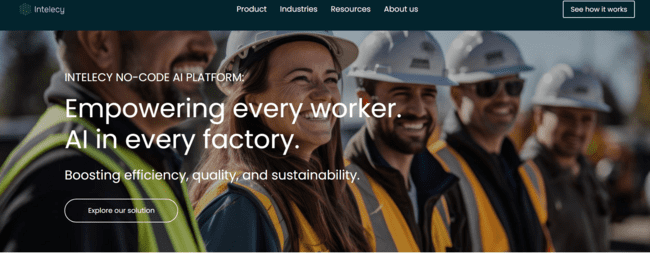
4.Acalvio Technologies
Founded: 2015 | Location: Santa Clara, California | Total Funding: $33.1 million – Link
Acalvio Technologies is employing artificial intelligence to shift the advantage from attackers back to defenders. This Silicon Valley-based startup specializes in advanced cyber deception technology, offering a proactive approach to identifying and mitigating sophisticated threats. The startup’s innovative approach aims to proactively mislead and disrupt attackers rather than merely responding to intrusions.
Technological Innovation:
Acalvio’s core AI-powered deception platform strategically deploys realistic-looking decoys and lures across IT, OT, and cloud environments. These deceptive elements are designed to entice attackers, and any interaction triggers high-fidelity alerts, enabling early detection and disruption of malicious activity. The technology goes beyond traditional perimeter defense by focusing on detecting lateral movement and attacker behavior inside the network, a critical phase often missed by conventional security tools. Applications range from sophisticated identity threat detection to gaining real-time threat intelligence by safely engaging with adversaries.
Market Influence:
Acalvio has secured funding from prominent investors and is renowned for pioneering cyber deception work. Fortune 500 companies and government agencies utilize their solutions to protect against various threats, including ransomware and identity theft. A recent milestone for Acalvio, as of March 2024, includes cementing its leadership position in the deception technology market, highlighted by industry recognition for its innovative platform and approach to preemptive cybersecurity.
Future Trajectory:
Acalvio’s technology has the potential to significantly reduce attacker dwell time and enhance the efficiency of security operations centers, contributing to a more resilient cybersecurity posture for enterprises facing increasingly advanced threats.

5.Allen Institute for AI (AI2)
Founded: 2014 | Location: Seattle, Washington | Non-profit organization – Link
The Allen Institute for AI (AI2) operates with the mission to conduct AI research and engineering for the benefit of society. Founded by the late Paul Allen, this non-profit research institute is a prominent entity in the AI landscape, distinct for its commitment to high-impact research and open science.
Technological Innovation:
AI2 focuses on foundational AI research across areas like natural language processing, computer vision, and the development of common-sense AI systems. Their work aims to push the boundaries of AI capabilities and translate breakthroughs into real-world applications. Key initiatives include developing large-scale open language models and applying AI to critical global challenges such as environmental conservation and scientific discovery, notably through projects like Semantic Scholar and tools for climate modeling.
Market Influence:
A recent key achievement for AI2 in early 2025 is their collaboration with Google Cloud to accelerate open AI innovation. This partnership involves making AI2’s open models, including the OLMo family, available on Google Cloud’s Vertex AI platform, aiming to enhance accessibility and customization for researchers and developers.
Future Trajectory:
Through its dedication to open research and addressing complex problems, AI2 continues to influence the direction of AI development, fostering a collaborative environment aimed at harnessing AI’s potential for broader societal benefit.
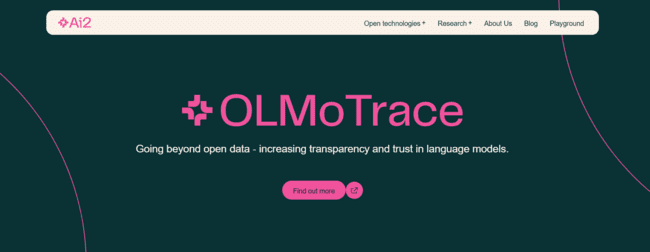
6.Slingshot AI
Founded: 2024 | Location: Dallas, Texas | Valuation: $220 million – Link
Slingshot AI is an organization with the ambitious goal of building a foundation model for psychology. Their mission is to address the ongoing mental health crisis by leveraging advanced AI technology to provide scalable, personalized mental health support.
Technological Innovation:
Slingshot AI’s technology is being built to learn from diverse psychological approaches, moving beyond single-modality AI assistants. The aim is to create an AI that supports core psychological needs such as self-determination, autonomy, competence, and relatedness. This involves designing the AI not merely to provide answers but to constructively challenge users and encourage accountability, fostering personal growth. The real-world application lies in offering an accessible form of mental health support, particularly for individuals who may not be ready for or have access to traditional therapy.
Market Influence:
A notable recent phase for Slingshot AI involved engaging with over 25,000 beta testers, including mental health professionals. This period provided early user feedback on the AI’s utility and impact. Numerous businesses utilize their platform to increase conversion rates, shorten sales cycles, and boost overall revenue. Slingshot AI is establishing a new benchmark for AI-powered sales solutions.
Future Trajectory:
While acknowledging the early stage of the technology, Slingshot AI’s focus on building a comprehensive psychological AI model points towards a potential future where AI could significantly broaden access to mental health resources and empower individuals in their personal journeys.
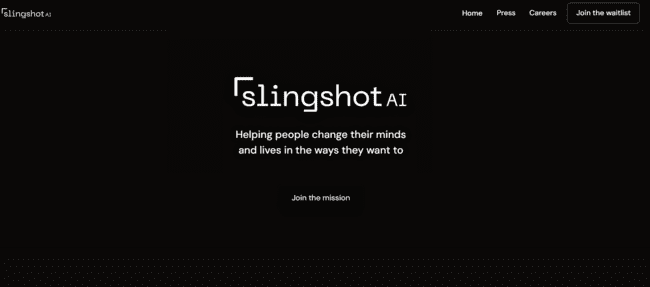
7. Icon
Founded: 2025 | Location: New York, USA | Total Funding: $12 million – Link
Icon AI Ad maker streamlines from spending hours making each ad to building entire campaigns in minutes. It’s developing an AI-powered platform designed to automate key stages of the digital advertising process, from planning and creation to execution.
Technological Innovation:
Icon’s technology integrates multiple AI-driven tools within a single platform, aiming to replace the need for numerous disparate software solutions. Capabilities include AI-assisted ad generation, video editing, static design, competitor analysis, and creative performance analytics. The platform is being developed to allow for both automated end-to-end ad campaign management and manual, assisted ad creation. The intended application is to provide brands, agencies, and creators with a more consolidated and potentially faster approach to producing and managing digital advertisements.
Market Influence:
A significant early development for Icon is securing investment from notable backers, including Founders Fund and key figures from the AI industry. This initial support underscores interest in their vision for an integrated AI ad-making platform. Over 1288 brands have already embraced the platform. The platform boasts the potential to dramatically increase ad production, with claims of businesses scaling from 30 to 300 ads per month while simultaneously cutting costs by $2,000 to $30,000. This potential is further underscored by the recent $9.2 million in seed funding the company secured, indicating strong investor confidence in their vision.
Future Trajectory:
Icon AI Ad maker has set ambitious goals, by seeking to automate and consolidate various aspects of digital ad creation and management. Icon’s approach highlights a potential future direction for the advertising technology sector, emphasizing efficiency and integrated AI capabilities.
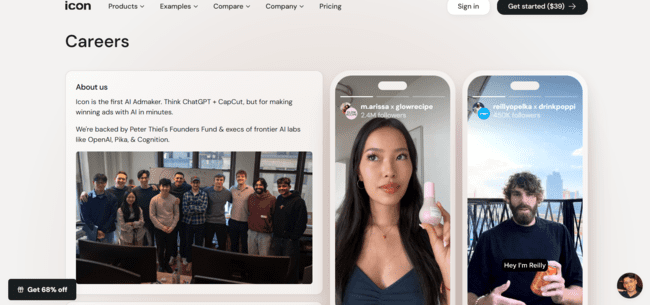
8. Zuma
Founded: 2016 | Location: San Francisco, California| Total Funding: $7.31 million – Link
Zuma is an AI-driven platform designed to streamline and optimize the full resident lifecycle for multifamily property management companies. Zuma aims to alleviate operational burdens for property managers by automating routine yet critical tasks. Companies understand that data is crucial for better decision-making but often struggle to extract meaningful insights quickly and efficiently. Zuma provides an AI-powered solution to this problem.
Technological Innovation:
Zuma’s platform features AI assistants designed to handle tasks such as 24/7 lead engagement for leasing and automating rent collection workflows. By instantly responding to prospective residents and managing collection communications, the technology aims to reduce manual busywork and accelerate key processes. This hybrid approach integrates AI capabilities with existing human teams and systems, allowing managers to focus on strategic growth.
Market Influence:
The deployment of Zuma has reportedly yielded notable results for clients, including a significant increase in lead-to-visit conversions and overall conversion rates. Additionally, the platform is credited with substantially reducing the workload associated with rent collection and cutting down bad debt, demonstrating a tangible impact on operational metrics and financial outcomes in property management.
Future Trajectory:
Zuma illustrates a trend towards AI adoption in the real estate sector. Its potential impact lies in driving further operational efficiencies and enabling property management teams to reallocate resources towards business expansion rather than administrative tasks.
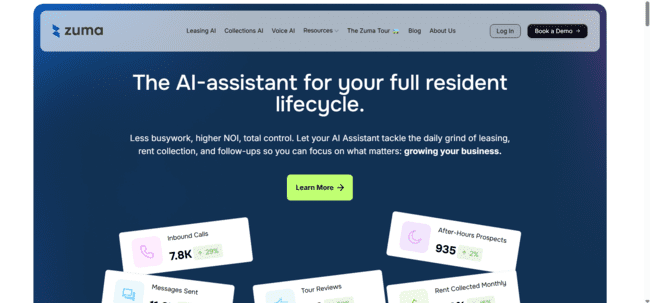
9. SendBird
Founded: 2013 | Location: San Mateo, California | Valuation: $1 billion – Link
Sendbird is leveraging artificial intelligence to provide businesses with comprehensive communication solutions. It’s AI agents which are used for customer service teams sources its knowledge from live Salesforce Knowledge articles. The company specializes in an AI-powered platform designed for omnichannel messaging and automated customer interactions across various digital channels.
Technological Innovation:
Sendbird’s technology unifies communication touchpoints, allowing businesses to manage customer support, sales, and engagement efforts through a single platform. A key component is their AI customer service agents, capable of providing instant, 24/7 support and proactively engaging customers. The platform also features a centralized AI Control Center for managing these AI workforces and integrates with communication APIs for chat, voice, and video. This approach aims to streamline operations and enhance the customer experience.
Market Influence:
Sendbird has become a notable player in the in-app communication space, serving diverse customers, from startups to large enterprises. Sendbird reports supporting billions of end users globally with hundreds of millions of monthly active users and maintaining high uptime. These figures reflect substantial deployment and operational reliability of their platform in facilitating large-scale customer communications.
Future Trajectory:
By focusing on scalable, AI-powered omnichannel communication, Sendbird’s work points towards a future where integrated AI agents and messaging platforms could become standard for businesses seeking to efficiently manage diverse customer interactions.
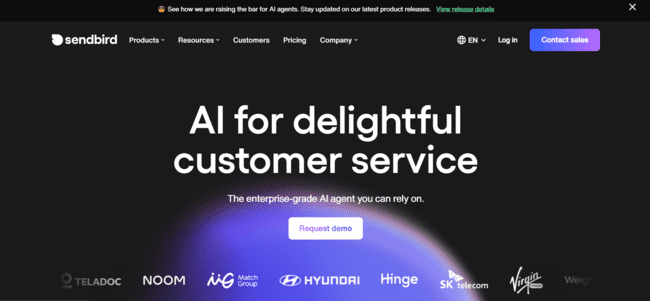
10. Humanloop
Founded: 2020 | Location: London, UK | Total Funding: $2.85 million – Link
As organizations increasingly build products powered by large language models, managing their development lifecycle presents new challenges. Humanloop, a startup in the AI sector, is addressing this need with a platform designed for building, evaluating, and optimizing AI systems that utilize LLMs.
Technological Innovation:
Humanloop provides a platform that enables developers to build and refine AI models through human feedback. Their unique approach combines machine learning with a user-friendly interface, allowing developers to easily label data, identify errors, and iterate on their models. This human-in-the-loop system is distinctive in leveraging human expertise to improve AI performance and trustworthiness. The founding team, with backgrounds in machine learning and human-computer interaction, is driven by the vision of creating powerful and responsible AI.
Market Influence:
Based on reported customer outcomes, Humanloop’s platform has facilitated significant improvements in development speed and team productivity. These results, shared by clients, indicate the platform’s practical impact in accelerating the deployment and refinement of AI features leveraging LLMs.
Future Trajectory:
Humanloop approach to human-centered AI development, positions it well to address the growing demand for AI systems that are not only powerful but also trustworthy, unbiased, and aligned with human values and intentions. Opportunities include developing more sophisticated feedback mechanisms for multimodal AI systems, integrating with a wider range of AI frameworks and model providers, and pioneering new approaches to AI alignment and safety.
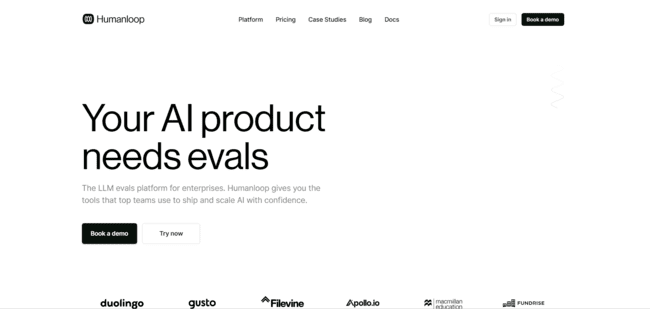
Conclusion:
As we look toward the future of artificial intelligence, these ten startups exemplify the tremendous potential for innovation and impact in this rapidly evolving field. From Clay’s customer engagement platform to Humanloop’s human-centered AI development tools, each company is addressing critical challenges with creative solutions that harness the power of AI. What sets these ventures apart is not just their technical prowess, but their ability to transform complex technologies into practical tools that deliver tangible benefits. With collective funding exceeding $1 billion and valuations reaching into the billions, these startups represent the next wave of AI innovation. As they continue to refine their technologies, expand their market presence, and navigate the challenges of scaling, they offer a glimpse into how AI will continue to transform industries, enhance human capabilities, and create new opportunities in the years ahead. The success of these companies demonstrates that the most promising AI applications aren’t just technically impressive, but also, they’re meaningful solutions to real-world problems.




